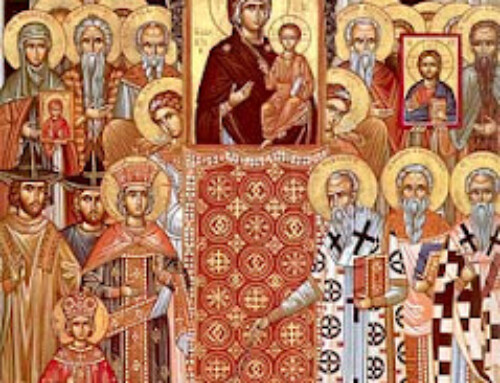Word Magazine March 1990 Page 17-18
READING AND CHRISTIAN FORMATION IN CHILDREN: PART III
By Archpriest Jack Norman Sparks
The Department of Christian Education is pleased to bring this series of articles on reading and Christian
nurture to our Archdiocese. Father Jack Sparks is a specialist in this field and makes for delightful reading himself
For further suggestions of readily available books with Christian themes, order Creative Activities I from the Department of Christian Education, 358 Mountain Rd, Englewood, NJ 07631 ($6.60, including postage and handling). —John L. Boojamra
When our children start school, our role as parents guiding their input from reading becomes both easier and more complicated. Why easier? Well, for one thing, we soon find them much more able to find books and read them on their own. So we don’t have to do all the reading to them. Why more complicated? Because we now have to work harder to get together suitable reading materials for our children and because they also are beginning to read materials we have not seen. We don’t always know what they are reading at school.
Every good thing has its dangerous side. So it is with reading. Our children now have greater access to materials we might consider unsuitable or even harmful. No longer is our sensitive eye ever-present to scan ahead, to skip what we judge should not be read at this time or to select passages which need specific comment on our part.
Still, we do not want to abandon our children to the indiscriminate use of this horizon-widening new skill. And we should not. It would be irresponsible to do so. There is much we can and should do to help our children use their newly discovered ability to read in making progress toward the most important goals in life, while at the same time guiding them through the maze of ideas they will find on the printed page.
Amid all this we must keep in mind that we wish to rear our children as (a) worshipping, practicing Orthodox Christians, (b) able to relate their faith to the culture in which they live, (c) grasping and understanding as much as possible the good and bad aspects of that culture, (d) helping work it all for good.
Recently I watched a television drama in which a man was frustrated because his only son was a miserable failure at business and finance, while his daughter was a successful businesswoman — and the father hated and despised his daughter’s success. I suppose the point was that he was being sexist, expecting his son to be a business success and his daughter to do something more “feminine.” The drama was built to a sentimental conclusion in which the viewer was expected to be tearfully happy when the dying father told his daughter she was all anyone could hope to have in a child. And I did find tears coming to my eyes. But that did not happen because I thought the story line was right. It was because I realized that business and financial success is not what I consider most important for my own sons and daughter. What I want is for them to be truly godly and good people, worshipping God, caring for others, rearing their children with love and diligence — and I realized that is just what they are, thank God, in spite of all my errors in childrearing. No man could be happier with his children.
My reaction was not anything against success. We should all strive to do our best at whatever we are called to do — or simply must do. That, too, is godly. We want our children, however, to be aware of, and to strive for, the higher goals. But how do such values get communicated to our children? Through us, obviously (and partly by what we are), but in the midst of a world in which a myriad of values and concepts are being thrown at them from all directions, many of them contrary to goodness and righteousness. Take heart, however, for surveys still show that children and young people rate their parents as more influential in shaping their opinions, beliefs and attitudes than any other source. We would do well to remember this influence and behave accordingly.
When I was very small — still too young for school, even — my grandfather used to read to me from his own school books. There is no way I can tell how these things affected me, but I still remember some of the excerpts of verse and prose he had me memorize.
Familiar yet today is a poem from my grandfather’s fifth reader, “A Psalm of Life,” by Henry Wadsworth Longfellow, the last three verses of which read:
Lives of great men all remind us
We can make our lives sublime,
And, departing, leave behind us
Footprints on the sands of time; —
Footprints, that perhaps another,
Sailing o’er life’s solemn main,
A forlorn and shipwrecked brother,
Seeing, shall take heart again.
Let us, then, be up and doing,
With a heart for any fate;
Still achieving, still pursuing,
Learn to labor and to wait.
The above thoughts may seem a digression from our topic, but I assure you they are quite relevant. They have very much to do with reading and Christian formation in our children. There is much concern in North America today about literacy and especially cultural literacy. These are legitimate concerns for any society which considers itself worthy of perpetuation, and we enter heartily into the concern of our nation. We should consider cultural literacy not only for society in some vague, untouchable and undefinable sense. These concerns must be for families who care about their children, who want to see them continue in their family traditions, for parents who want their children to have the goals and values in life which they themselves treasure.
I have known people — perhaps they are common in our land — who behave as if parents should have no concern or even right to influence the lives of their children to be like them, as if that concern were vaguely that of schools and other institutions of society. But Orthodox Christians must not have such a view. We must deliberately set out to help our children be as thoroughly Orthodox Christian as possible. We must pursue literacy in the “culture” of the Age to Come, the Kingdom of God.
So, then, when our children start to read, we must not stop reading to them, and we must be all the more diligent in seeking out things we want them to read. Of course we will continue to read Bible stories and stories of Church heroes in our family reading hour. Light and Life Press has just published the second of John Young’s volumes of stories of saints, Heroes of Faith, but we need more such material. Some years ago I conceived the idea of a history of the Church for children. Presently I have completed some 86 short chapters of what might be called, “Chapters in Church History: Readings for the Family Hour.” Who knows, perhaps someday I will finish this work— even get it published, for I do believe the content and the format can help children better understand the faith and its practice.
But, we want our children to have a broad knowledge of the culture in which they live and the background of its formation, of the ideas and values which have made it what it is. That will help them to become literate in Orthodox Christian culture and relate knowledgeably and intelligently to secular culture. In a recent speech reported in Chronicles: A Magazine of Christian Culture, John Silber, president of Boston University, pointed out that even a poem as simple and touching as Milton’s sonnet on his deceased wife is beyond the understanding of someone who did not know Greek myth and Greek literature. Previously I recommended William F Russell’s Classics to Read Aloud to Your Children. To that I would now add his recently published Classic Myths to Read Aloud. Both are arranged for understanding by children five years and older. These stories are not only interesting but especially valuable in helping your child gain insights into the culture within which we live. They will also help children to understand references to classics made in the Scriptures and in the writings of the Fathers of the Church. Certainly, these two collections represent only a smattering of the classic writings, but even if they are all our children ever hear or read, they will know more than what most children get from sources outside the home.
It is important to build a home library of books to read more than once — even if this library must be very small at first. Many people do not realize it is possible to build a respectable library of very good books by browsing in used book stores. You do not have to buy all new books, though we should all buy some. I have sometimes jokingly said I know the location of every used bookstore in the United States and Canada. I must admit that is not true, but I sure am familiar with a lot of them. Anyway, there are lots of ways of acquiring books which will be read time and again. And we must not neglect our local libraries. These are goldmines of reading materials for those years when children guzzle books like water.
Regardless of what you might do in terms of finding books for your children to read on their own — and you know I encourage that — you must try to establish and keep up a family reading hour at which you read to all your children. A child need not be “old enough” for a certain book to enjoy being in the group hearing it read. And none of us are “too old” for good stories. Among the stories you will be reading aloud by the time your children are going to school are the Winnie-the-Pooh stories by A.A. Milne, found in Winnie-the-Pooh and The House at Pooh Corner and published complete in the collection, The World of Pooh. The tattered volume from which we read to our children still rests on a shelf in my study. I must confess I have read from that book to rapt audiences of adults. On one occasion, after I had read one of the Pooh stories to a group of young adults in Berkeley (this was in the early seventies), one young man commented, “I always thought these were stories for children, but these characters are like a bunch of burnt-out hippies.” Perhaps not the most apt description, but it was meant as a compliment, and I know what he meant, for people of all ages and all segments of Western culture find facets of the Pooh stories which touch their own inner thoughts and feelings.
Just a word about some more collections of stories you will want to begin reading aloud when your children are starting school. Among these are several excellent collections by Andrew Lang, including his Red Fairy Book, Blue Fairy Book and Green Fairy Book. A little later you will also want to find his compilation of Arabian Nights. You will also want to be reading Andersen’s fairy tales and the fairy tales of the brothers Grimm. Harper and Row have published an excellent selection of the former Hans Andersen: His Classic Fairy Tales. Grossett and Dunlap, who publish many children’s books, have published a readable set of the Grimm fairy stories. It would be unforgivable to fail to read at least some of Rudyard Kipling’s Just So Stories, of which there are several collections available. There is a very good periodical which publishes some of the old stories from time to time, along with Bible stories and stories of Christian heroes. St. Paul’s Family Magazine is published out of Fort Scott, Kansas, and is, as far as I know, the only magazine of its kind.
And poetry. Keep on reading poetry. Always read poetry and verse! Children love poetry and verse, but usually if it has rhyme and rhythm. Keep reading Robert Louis Stevenson’s A Child’s Garden of Verses and Silver Pennies. Find and latch on to copies of The Oxford Book of Children’s Verse and The Oxford Book of Children’s Verse in America. A copy of the latter is a cherished and much-used volume in my own library. Helen Ferris’s Favorite Poems, Old and New can still be found in used bookstores even if it is out of print. I recently ran across Joanna Cole’s A New Treasury of Children’s Poetry, which I had not previously seen. It includes a number of pieces of verse young children will find hilarious. Somewhere in a used bookstore I picked up a copy of Robert Frost’s You Come Too: Favorite Poems for Young Readers put together by the poet especially for children, and it has become well-read. I almost hesitate to mention my well-thumbed The Best-Love Poems of the American People, because it was published in the 1930’s and is most surely out of print. Still, I saw a copy in a used bookstore recently for $4.95. What a steal! Of course most of the collections I have so far mentioned suffer one handicap — they lack illustrations, and we do have to face facts: illustrations are helpful in books for children (not to mention adults). Among the excellent illustrated books of poetry is The Random House Book of Poetry edited by Jack Prelutsky. Also, I recently sent the newly published Tomy de Paolo’s Book of Poetry to some of my grandchildren, and their mother reports they love it. So, look around, explore! You can find many good anthologies of poetry, but there are some old favorites you definitely will want to have.
In terms of realistic and true stories, there is much to choose from. I would suggest Christmas and Rain by Spier are two especially outstanding and beautifully illustrated stories. A really fun
book which helps children see how we become aware of the world around us is Helen Borten’s Do You Know What I Know? And I guess this leads to a very important point. We want our children to learn, so we choose books which teach them concepts and facts we want them to know, but in making those choices, we must also make sure the books we choose will be interesting to the children as well. Otherwise it will not work. We can get by with some stories kids think are boring, but not consistently. Nor will they call again and again for something which doesn’t capture their attention. To help in making such choices, you might want to get a copy of Elizabeth Wilson’s Books Children Love: A Guide to the Best Children’s Literature.
One thing I have discovered is that there is no use trying to read to children from a book I don’t enjoy myself. Count on it: they won’t like it either. And, I have had to learn over and over again not to make reading time obviously a lesson time. Yes, there are lessons to be learned from the books, and we choose some of them specifically for what they teach, but once we start reading, forget the lesson and concentrate on the fun. Even if you ask your children some questions about the story and initiate a discussion (and that is often appropriate), make it casual, not a quiz show.
Next time we will step up to books for older children and add a few more categories, as well. Somewhere along the line, we will also talk about reading aloud and how we can become effective storytellers. Once again, our talks are to be continued . .




